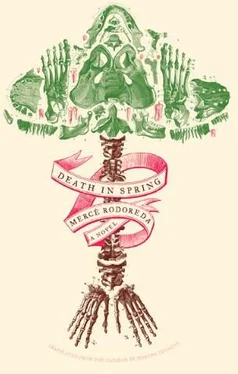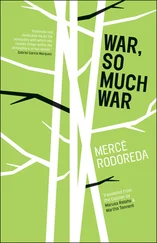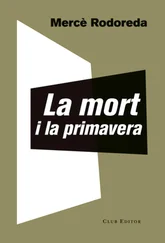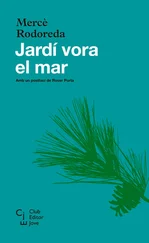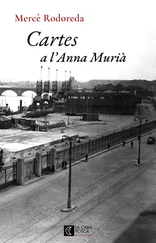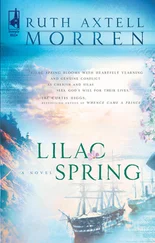The glare was so terrible when they removed the bandages from my eyes that I wanted to shut them but couldn’t. I covered them with my arm. An old woman, one of the group who had shouted horrid words at Senyor, told me that fire had consumed my body the first days after swimming under the village; she said I had talked about the prisoner. I put my hand to my forehead; I was missing an eyebrow. The old woman looked at me calmly, her hands clasped together over her stomach, and told me not to touch the wound because the skin was still very tender. She was small, with sunken cheeks, her earth-colored skin furrowed with deep wrinkles that went from her eyes all the way to the bottom of her face. She stared at me with an open mouth. My legs almost gave out when I stood up; instinctively I headed toward the village, and as I walked, my legs again learnt how to walk. I left without saying a word to the old woman who had taken care of me. At the entrance to the village, I turned back and headed to the stables. The enclosure had been rebuilt, reinforced. But the stables were just as they were the night of the fire. I remember stopping at the Festa esplanade. With the glare, everything looked blurred. A man walking in the distance seemed to be a man who lived only in my thoughts, and my thoughts could not bring him into focus. I reached the part of the river where calm water joined it. The canes were still. I sighted the tree of death on Maraldina. To my left, farther away, lay the dark green smudge of the forest of the dead with the higher mountains beyond, rising one behind the other. I sat down on a bench, my head on my arms, my arms on the table. I looked at my feet, moved them, scattered a bit of earth, then suddenly I kicked the ground and struck the table. I stood up, holding my arm in front of my eyes, and edged toward the canes in the water. Dead leaves and brush were floating on the river and a piece of driftwood where the canes started. In the shady spots, the green water looked black. I leaned down to the water, letting half of my body hang over it. I rested on my hands and knees: head over the river, body over the shore, hands in the mud. I remained like that for a while, gazing in front of me at the other side of the river; then I looked down into the water and saw my father’s face.
It was dark when I got home. The door was open and my wife was standing at the entrance to the courtyard. I stood before her, but she wouldn’t look at me. When she finally did, she turned her back. I left the village in the early morning and didn’t stop until I reached the spot where they had thrown me in the river. The sky was beginning to turn pink. The blacksmith’s son was lying down; from a distance I couldn’t tell if he was sleeping or if he could see me. I returned to the village. The men leaving their houses passed by me, but it was as if they had not passed anyone. They talked among themselves, said “bon dia” to each other, as if I were a shadow, nothing at all. That night I went round to the blacksmith’s son. He told me I didn’t need to visit him, he didn’t need anyone. Said he spent all his time thinking about the fire, the joy of setting fire to the stables and his house, his father’s house. Said he wasn’t the one who set fire to the other houses. It all began when the boys returned from killing the old man with the cudgel, but he had been responsible for the killing because he had made people realize that without his cudgel the man was less than a feeble old woman. If he hadn’t hidden the cudgel that night, the old man would still be alive. I who have always seemed dead, I killed half the village. As he gazed at his blazing house, he had felt something he couldn’t explain, as if he were master of it all. He could give everyone orders, see them all bowing to him, subservient. Some were throwing water on the fire, others crushing the old man’s head, fire and flames spitting into the air, causing the black night to glimmer. I — he said, speaking in a clear voice — I who have spent all my life in bed, without food, I was in charge. My father — his legs crooked, his nails black from working with iron — was running back and forth, unable to cage the prisoner. Now I have made myself a prisoner, and I won’t stop until I am confined in the cage. The whole village will say the blacksmith is an evil man who caged his own son. He drew near me, looked at my face, and said, they made you a face like your father’s. Better that your child be dead, that she not see you with this face that isn’t a face, a child who was everyone’s child, you knew she was everyone’s child. You’ve always been subservient, you who could eat according to your appetite and I, son of the blacksmith, always ill, I set fire to my father’s house, I was in charge for one whole night. Man is partly from air, partly from earth — the prisoner’s stories — he always told the same, but it was the blacksmith’s son who set fire to the village, and the villagers still think the clash began because some of them wanted people entombed with cement, others without. All that was needed was to set the village on fire while their minds were on other things. We will never have another man with a cudgel, but we will have a prisoner. My father won’t have the house he once had; everything that I had wished for as I lay in bed had seeped into the walls and died with them. He asked me to touch him, so I would see he was alive. He said he wouldn’t die for some time yet, in order to remember that night when he roamed the village filled with joy, more joy than he was able to express, while all the men fought each other. Don’t think about it; you have to believe that it’s all the same to have a face or have your forehead ripped away. It’s all the same to live or die if you have to live as I was made to live. Learn to make fire by rubbing sticks together; learn to start a fire and you’ll be happy. A fire that causes damage.
I remembered a little animal with four legs and a tail that had allowed itself to be caught because I pretended I hadn’t seen it. When it had calmed down, I picked it up by its soft belly; its eyes bulged from its head. That animal came to mind because I felt as if I was being followed by several people, not just one, but the sound of the waterfall prevented me from hearing their footsteps clearly. I heard them when a branch broke, then another snapped. In the village, people pretended they didn’t see me, weren’t aware of me, as if I were dead, more than dead, so they could enjoy hunting me down, make my eyes bulge. The animal’s eyes were honey-colored. Without knowing where I wanted to go that night, I had headed to Font de la Jonquilla; I could see the tall shadow of the mountain in front of me, to my left the river and the trees I had loved when I was little, the ones that swayed in the wind — the entire tree, root to tip — and stretched upward during the night. I turned round sharply when the branch broke and again when it snapped. As the branch snapped, I thought I saw a shadow hiding behind a tree trunk. Everything that was green and leafy grew during the night, not with sun and light, but secretly, during the night. I too hid behind a tree trunk and waited there for a moment, but I heard nothing. Only the waterfall and the sound of gushing water. In the moonless night the river was black, and the path gradually turned away from the river as it approached Font de la Jonquilla. Again, I hid from the shadow walking behind me. As it passed me, I thought it looked like my wife, who no longer lived at home. I covered my eyes with my arm. After a while I started walking again. Someone was at Font de la Jonquilla, so I climbed to the spot where the white-flowered ivy grew and curled up. Not even the tree trunks were visible; everything was silent except the faint sound of the waterfall and the nearby fountain splashing over the rocks. The air was cool and the ivy leaves rustled, brushing against each other, giving the impression of speaking to one another every time they touched. Very close to me I heard someone move. Or were there two of them? Everything was dark. It seemed to be turning darker and darker, as if darkness were growing, emerging from the leaves that brushed each other. The smell of water and flowers reached me. The sound of gushing water from the fountain broke off for a moment, and I assumed someone was drinking from cupped hands. Then I heard the water cascading again with full force. I listened and heard someone groaning, but not from pain, and the groans were mixed with the sound of the water. I left my hiding place and jumped down, not sure where I had landed, but I could sense the shadow. I couldn’t see it, but I could feel it and the cool air from the water blowing through my toes. Then the shadow jumped on me, grabbed me by the neck, and was tightening its grip on me, but I was able to throw it off and ran as fast as I could, somehow finding the path that led away from the fountain. The shadow chased me, but I ran faster, until finally I was back at the river and trees and the shadow came to a halt. It wasn’t the same shadow that had followed me at the beginning. I heard it turn back toward the fountain, and gradually the sound of the waterfall grew fainter, until it finally melted away, and only the noise of the river by the growing trees remained. The shadow’s breath smelled of dead horse.
Читать дальше
